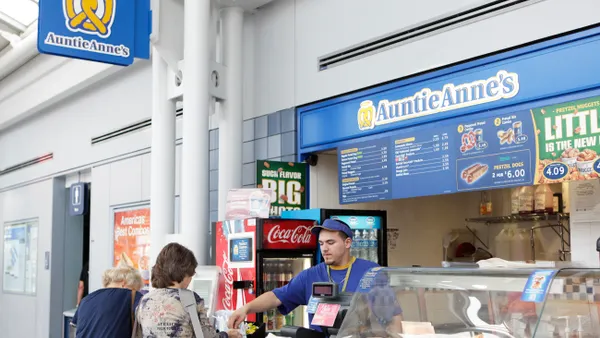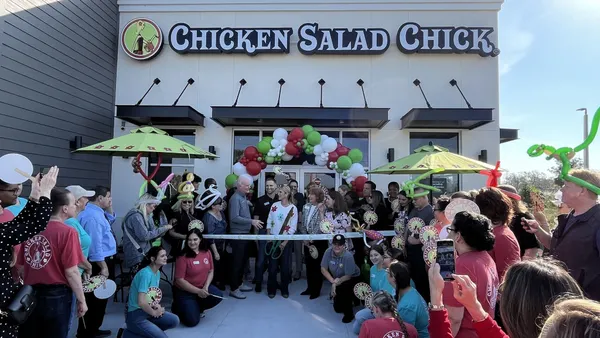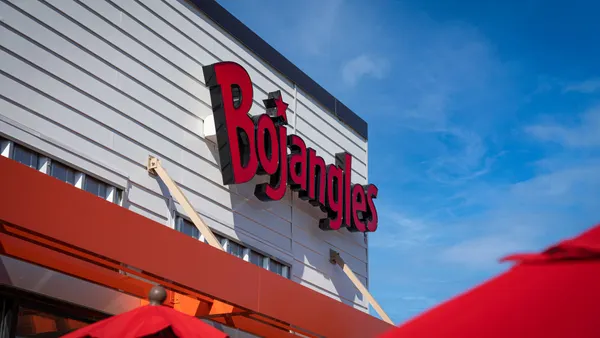UPDATE: Jan. 22, 2021: McDonald's USA President Joe Erlinger called on restaurant operators in a video on Thursday to end a six-week nonessential communication freeze with corporate, Restaurant Business reports. The publication also reports that Erlinger discussed two new franchisee complaints — that operators want extended breaks for delivery orders and lower rent for low-volume stores — in addition to franchisees' initial concerns over the end of Happy Meal subsidy and new fees to cover technology debt and costs associated with McDonald's tuition program.
Dive Brief:
- Ninety-five percent of McDonald's U.S. operators voted to pause nonessential meetings with corporate on Monday, according to a memo from the National Franchisee Leadership Alliance obtained by Business Insider. The decision is meant to be "a symbol of support for National Owner Operator elected leadership as the voice of the system" and to push McDonald's to address concerns over several new operator fees.
- McDonald's told the publication that it is addressing these issues and had a "productive meeting" with franchisees on Tuesday. "The company acknowledges the situation and will continue to make every effort to engage franchisees so that together we can effectively operate our business," the chain told Business Insider.
- These tensions come as McDonald's prepares to end a monthly Happy Meal subsidy it pays to franchisees, shift operators to a "pay as you go" model for technology investment and require franchisees to partially fund its Archways to Opportunity tuition program. These changes could cost operators $170 million in 2021, or roughly $12,000 per location, franchisees told Restaurant Business.
Dive Insight:
McDonald's operators held a systemwide call Friday to first talk about limiting contact with corporate after the company announced the extra costs operators will take on next year, Business Insider reports. More than 1,800 operators were on the call despite less than 48 hours of notice, and operators told the publication that it is unusual for franchisees to make unified posture against corporate practices.
Operators plan to hold another call this Friday to discuss next steps, and will schedule a third call by mid-January to share details on progress. In the NFLA's Monday memo, operator leadership clarified that the break in communication with McDonald's doesn't mean franchisees should "stop planned meetings or work that he or she deem essential to operate their business or that would impede their business results."
The speed with which McDonald's planned cost changes have eroded franchisee trust and goodwill isn't a good sign. Just two months ago, Kalinowski Equity Research reported that McDonald's operators were more optimistic than they had been in years. Now, franchisees are aligned in giving corporate the cold shoulder until they feel their concerns are taken seriously.
Along with the new costs set to begin next year, McDonald's also plans to invest in employee development in 2021 — a move made possible by offloading some cost burdens to franchisees. Still, franchisees are worried that company changes will hurt their revenues, putting operators and corporate back on the rocky footing that has become emblematic of the entities' relationship for over the past few years.
McDonald's also claims that these company policy changes have been in the works for months and, in some cases, years, and that operators were aware they were in process. But operators told Restaurant Business they were "blindsided" by these impending changes.
Franchisees have seen sales gains in 2020 as many chains and independent restaurants have suffered losses, a testament to the system's extensive drive-thru channels as well as the success as celebrity-anchored LTOs and corporate's $100 million marketing investment. But these victories could be overshadowed if franchisees truly feel their concerns are being ignored by their parent company — a sentiment that could further sour if the cost changes' impact on revenue is as bad as operators fear.












